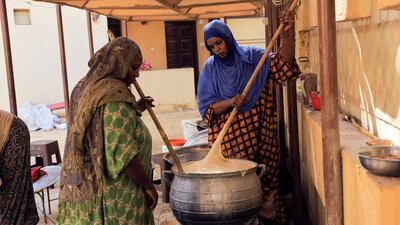About a quarter of Sudan’s population of 44 million faces starvation, the UN has said.
The UN Office for the Co-ordination of Humanitarian Affairs, or Ocha, said it estimated that 11.7 million would be at risk from acute hunger between June and September, an increase of about million compared with the same period last year.
Sudan’s growing food crisis has been caused mainly by economic problems and persistent dry spells, Ocha said.
The report, issued on Wednesday, adds another layer to the political and economic crises in Sudan.
A military takeover last October derailed the country’s democratic transition, sparked a wave of street protests against the country's generals and led to the suspension of billions of dollars in western aid.
Most of those suffering from acute hunger are in the capital, Khartoum, the western Darfur region and the Kassala and White Nile provinces, Ocha said.
About four million children under the age of 5 and pregnant and nursing women are estimated to be acutely malnourished.
This includes 618,950 children with severe acute malnutrition, of whom about 93,000 suffer from medical complications and need specialised care, Ocha said.
Sudan’s economic crisis has been deepened by the effects of the Ukraine war, which led to higher energy and shipping costs.
Inflation in Sudan has reached more than 200 per cent, with soaring food and fuel prices hitting middle class and poor families.
Crime rates have also increased in major cities, including Khartoum.

Sudan's democratic transition began in August 2019 with a joint military-civilian government that was established after long-time president Omar Al Bashir was removed from power.
Gen Abdel Fattah Al Burhan, the army chief who led the military takeover in October, said it was necessary to spare the country from civil war and to “correct” the course of the democratic transition.
But the takeover has sparked regular protests against the military in Khartoum and other cities. At least 115 protesters have been killed by security forces and at least 6,000 injured since October.

